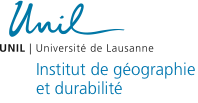Institute of Geography and Sustainability of the University of Lausanne
Research projects
Microlandscapes in Western Lausanne
| Research fields |
Urban matters Environmental humanities Margins, environment, landscapes |
| Keywords |
Nature in the city; plant-based urbanism; microlandscape; ecosystem services |
| Funding | SDOL - Schéma directeur de l'Ouest Lausannois |
| Duration | January 2020 - January 2021 |
| Website | |
| Researchers |
Da Cunha Antonio (Project co-applicant) [web] [email] Delabarre Muriel (Project co-applicant) [web] [email] Nasilli Serge (Actéon/OUVDD) Fernandes Ricardo (Actéon/OUVDD) |
The West Lausanne region is a territory in transformation. The eight municipalities of Western Lausanne are working together with numerous partners to meet the challenges of regional development. They are coordinating their efforts to offer their 70,000 inhabitants quality urban spaces, pleasant places to live, a strong identity and enhanced landscapes. In order to accompany the transformations underway and to ensure concerted action, they have created a structure (SDOL) to support multiple projects. It is this vision of a concerted reorganization of the territory that "Swiss Heritage" has rewarded with the 2011 Wakker Prize, by saluting the common will to reinforce the "spirit of the neighborhood" in a region that, a priori, hardly projects an image of identity.
The result of a collaboration that began in 2013, the Intercommunal Master Plan for Western Lausanne (Pdi-OL) is a territorial project that sets out the major orientations for future development: meeting the challenges of demographic growth, maintaining a prime location for businesses, identifying and connecting central areas, encouraging soft and multimodal mobility, and also improving the quality of the environment and preserving green spaces and recreational areas. The efforts made by the eight municipalities are not limited to large emblematic projects. A multitude of small, less visible initiatives are part of the same movement. Here a small square, further on a garden, elsewhere a bicycle path, etc. The possible improvements are immense and add to the overall urban quality. The habit of exchanging, informing and consulting widely within the framework of large projects as well as in the most modest actions constitutes a value in itself that contributes to the efficiency of collective action.
Created in 2017 in this general context, the Association "Ouest lausannois : Prix Wakker 2011" has set itself the goal of promoting inter-communal approaches that foster territorial development in the spirit of the values saluted by the award received in 2011. As such, it encourages and supports actions that have the following objectives: to preserve the built and natural heritage; to encourage the quality of future heritage; to promote local travel (soft mobility); to encourage the development of a regional identity; and to raise awareness among the inhabitants of the major challenges of regional development.
In this perspective, this project focuses on the role of plants as a tool for qualifying the territory in a context of strong urbanization. In line with the main orientations of the Intercommunal Master Plan, the "Microlandscapes" project proposes the realization of a joint action aiming to enhance neglected spaces, residual spaces, or places that can be the object of small interventions of requalification for the use of the inhabitants. Organized in agreement with the elected officials and the municipal services competent in the matter, the project initiated by the West Lausanne Association - Wakker Prize aims more precisely at :
- Strengthen the presence of vegetation and the ecosystem services it offers in the communes of the West Lausanne region;
- Participate in the implementation of a green network through an acupunctural vegetal urbanism: make accessible and appropriable abandoned places, requalify existing green spaces, renaturalize the city by small steps, conceivable and controllable in the short term, etc.;
- Involve the population, the associations but also the owners in a participative approach aiming at the vegetation, the equipment and the embellishment of the open spaces; act in the eight communes at the same time in an inclusive way;
- Involve the municipal park and promenade/roads departments in order to enhance their know-how and encourage new practices;
- Valorize the actions of the communes of Western Lausanne in terms of green urbanism and the requalification of public spaces.

